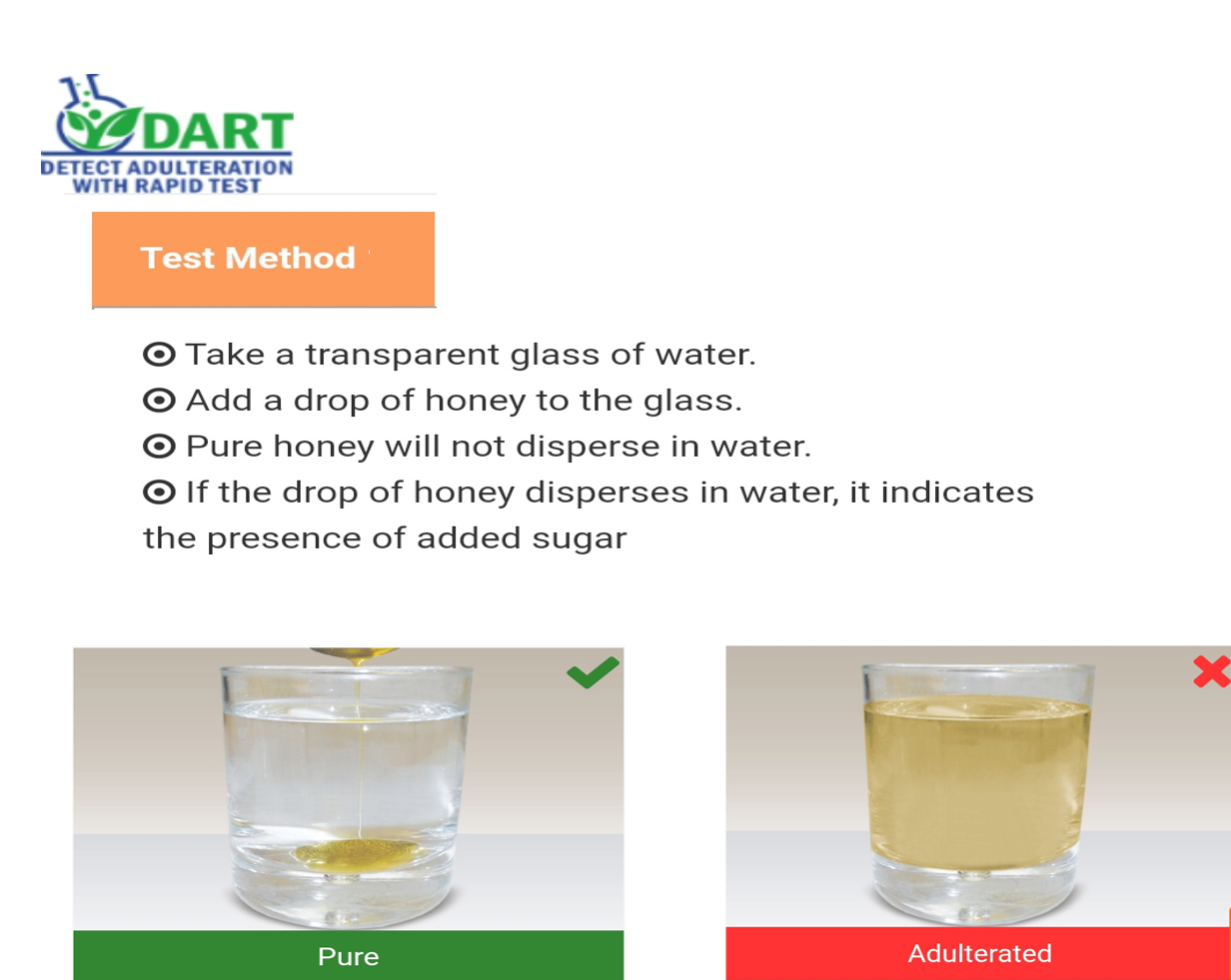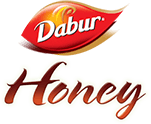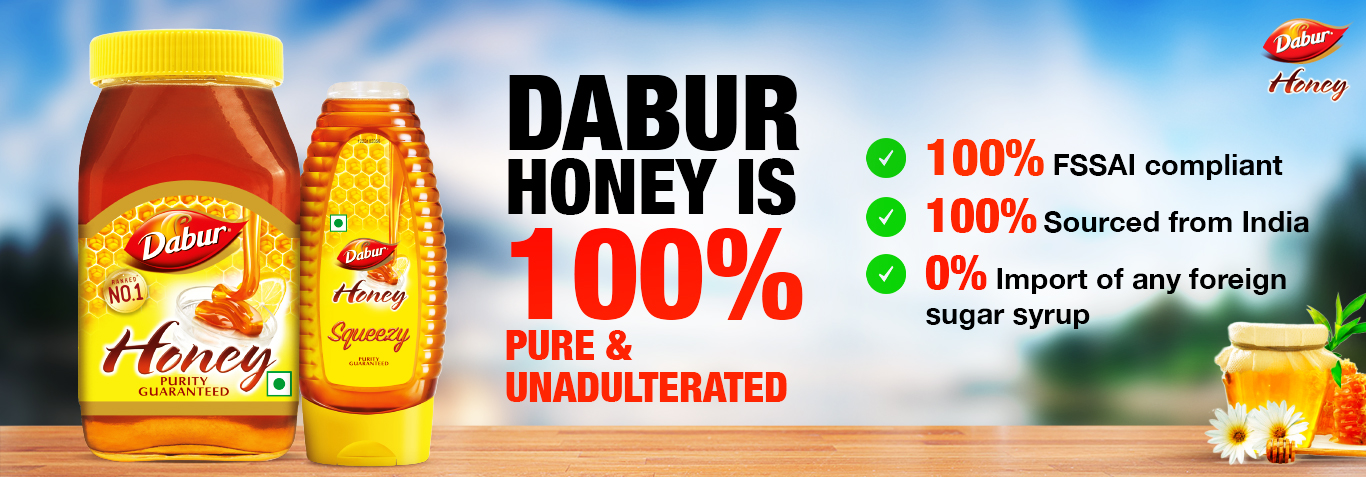FREQUENTLY ASKED QUESTIONS
Ministry of Health and Family Welfare, Government of India’s food regulator FSSAI (Food Safety and Standards Authority of India) recommends the DART (Detect Adulteration with Rapid Test), which is a common quick test to ascertain Honey's purity and can be done at your home.

We conduct 60+ quality checks to ensure that Dabur honey is 100% pure and unadulterated. This includes -
- EA-IRMS and LC-IRMS (both are used to check any kind of sugar adulteration)
- LC-MS/MS (for detection of antibiotics)
- SMR (to detect presence of rice syrup adulteration)
- ICP-MS (for heavy metals contamination) etc.
FSSAI (Food Safety and Standards Authority of India) has mandated tests for 22 parameters to be check purity of honey, of which the main ones are:
- Sugar adulteration
- C3/C4 sugar
- Specific Marker for Rice syrup (SMR)
- Foreign Oligosaccharides
- Antibiotics (9 groups)
- Heavy metals (7 heavy metals)
- Other physico-chemical parameters [Moisture content, F/G ratio, Hydroxymethylfurfural (HMF), diastase activity etc.
These tests are the most stringent in the world and every single batch of Dabur Honey undergoes these tests. All our batches have cleared these tests, which makes Dabur Honey 100% FSSAI compliant. For reference, we have attached test reports of FSSAI parameters. Please check here: https://bit.ly/36M8nsR
FSSAI (Food Safety and Standards Authority of India) is an autonomous body established under the Ministry of Health & Family Welfare, Government of India. It was established under the Food Safety and Standards Act, 2006, and is responsible for protecting and promoting public health through the regulation and supervision of food safety
- Yes, Dabur Honey is NMR certified. NMR has NOT been approved as a mandatory test by any Govt. food regulatory body either in India or any other country across the globe, including USA, Europe, Canada, Australia etc.
- Dabur being the market leader has the first corporate owned NMR spectroscope in India
For reference, we have attached NMR report (https://bit.ly/2JjilJf) of Dabur honey
- YES! Dabur Honey is 100% pure and unadulterated and clears all mandatory 22 FSSAI parameters for purity
- Dabur Honey is analysed for 60+ quality checks which includes-
- EA-IRMS and LC-IRMS (both are used to check any kind of sugar adulteration)
- LC-MS/MS (for detection of antibiotics)
- SMR (to detect presence of rice syrup adulteration)
- ICP-MS (for heavy metals contamination) etc.
Yes, Dabur honey clears the FSSAI-mandated SMR test, which is a highly sensitive test to detect rice syrup adulteration in honey. For reference, we have attached the SMR report (https://bit.ly/33KH7cb) of Dabur honey
Dabur Honey is 100% pure with no added sugar. It undergoes EA-IRMS and LC-IRMS tests to detect any kind of sugar adulteration
Dabur Honey is 100% indigenous and entirely sourced from local beekeepers across India, including plains of North and East India, foothills of Himalayas & Sundarban mangroves of India.
Yes, we have the best-in-class testing instruments in Dabur’s central laboratory and also in our manufacturing units used for honey analysis. This includes-
- EA-IRMS and LC-IRMS (both are used to check any kind of sugar adulteration)
- LC-MS/MS (for detection of antibiotics)
- SMR (to detect presence of rice syrup adulteration)
- ICP-MS (for heavy metals contamination) etc.
Furthermore, we also have NMR spectrometer to build a database of various characteristics of Indian honey.
- Honey crystallizes because it is a supersaturated solution. This means it has more than 70% natural sugar content and natural sugar tends to stabilize as crystals.
- Crystallization of honey is an absolutely natural phenomenon. It also occurs during change in season or sudden drop in temperature or moisture ingress due to multiple usage with wet spoons in bottles of honey.
- Other small particles or even air bubbles can also play a role in the crystallization process.
- Visit this link for more info.
- Yes, crystallized honey is completely safe for consumption
- Honey crystallizes because it is a supersaturated solution. This means it has more than 70% natural sugar content and natural sugar tends to stabilize as crystals.
- Crystallization of honey is an absolutely natural phenomenon. It can be easily liquefied by placing the container in warm/hot water or under direct sunlight.
- Yes, Dabur Honey is 100% original and pure honey without any adulteration. It clears all mandatory 22 FSSAI parameters for purity
- Dabur sources its honey from Indian beekeepers and tests all batches of honey for purity and absence of any adulterants like sugar syrup, antibiotics, metal contaminants etc.
It is natural for the color of honey to change over time due to the presence of high concentration (more than 70%) of natural sugars like fructose and glucose.
The natural color of honey depends on the Flora or region from which it has been collected. For example -
- Forest honey is darker as forests have high humidity and temperature
- Acacia honey is naturally lighter in color which is obtained from colder regions like Himalayan hills
As per Food Safety and Standards Packaging and Labelling Regulation 2011, it is mandatory to mention Manufacturing location and other mandatory details on the label.
During honey extraction from beehives, pollen and propolis also come along and are naturally present in honey. These fine particles may sometimes be visible and could be mistaken as suspended particles in honey.
No. Dabur honey is not pasteurized.
Honey can be used till full shelf life written on the label, even after opening. However, due care needs to be taken to prevent contamination and spoilage of the product after opening.
- As honey is hygroscopic in nature, it absorbs moisture from air, so there might be an increase in the moisture content of honey that may cause fermentation
- To make sure this doesn’t happen, it is important to keep the cap of bottle tightly closed and consume the product within the declared shelf-life
Honey is a supersaturated solution of naturally occurring sugars. High total soluble solids act as a natural preservative which coupled with low water activity ensures a longer shelf life.
Drinking warm water with a tablespoon of honey with dash of fresh lime juice first thing in the morning helps to increase body metabolism and also helps control your appetite.
- Honey is natural product and undergoes organoleptic changes over a period of time. So for optimum sensorial experience it is advisable to store hygienically and consume within the specified shelf life
- Poor storage conditions and multiple usage of wet spoon in a honey bottle may increase the moisture content in honey. This causes activation of yeast which in turn results in fermentation of honey
- It is important to maintain proper storage and usage practices including keeping the cap of bottle tightly closed
Honey is a natural product which is safe to be incorporated in many haircare and skincare regimes. Honey is a popular ingredient in many shampoos and beauty products. However, before any direct usage, it is recommended to consult a haircare expert.
Honey has a natural ability to absorb moisture, and is popularly used in skincare products and home remedies. However, before any direct usage, it is advisable to consult a dermatologist.
There is no evidence that single or mono-floral honey is better than multi floral honey in delivering specific health benefits, except very few limited varieties of honey available in specific geographies of the world.
NO, it is not advisable to use a wet spoon to scoop honey as it would increase the moisture content as well as be a potential source of contamination leading to deterioration in organoleptic and impact the shelf life of honey.
- TMR is the test procedure used to detect trace marker for Rice syrup and is not mandated by FSSAI.
- In India, a more stringent test parameter 2-AFGP/SMR (Specific Marker for Rice syrup) is mandated by FSSAI and is conducted to detect rice syrup adulteration in honey. Dabur honey passes this test
- NMR has not been approved as a mandatory test by any Govt. food regulatory body neither in India nor any other country across the globe, including USA, Europe, Canada, Australia etc.
FSSAI (Food Safety and Standards Authority of India) is an autonomous body established under the Ministry of Health & Family Welfare, Government of India. It was established under the Food Safety and Standards Act, 2006, and is responsible for protecting and promoting public health through the regulation and supervision of food safety.


